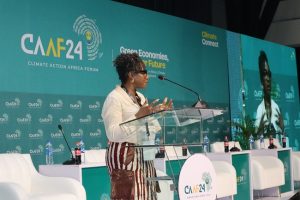Some stakeholders have called for collaborative effort to harness the opportunity of climate change and address the challenges associated with it.

The stakeholders made the call on Wednesday, June 19, 2024, at the opening of the two-day Climate Action Africa Forum (CAAF) 2024 in Lagos.
The forum had the theme, “Green Economies, Brighter Future: Innovating and Investing in Africa’s Climate Smart Development.”
Ms Ramatoulaye Diallo, Chief Executive Officer, Great Green Wall of Africa Foundation, said in her keynote address that stakeholders are decisive of the urgency with which Africa’s climate challenges are addressed.
Dialo said that aside climate change being one of the most critical issues in the 21st century, the reality of climate change was becoming more and more eminent.
She said that Africa was unfortunately in the heart of these realities and facing severe weather challenges such as rising temperature, erratic rainfall and desertification among others.
According to her, decisive action is essential in the battle to protect Africa, noting that, however, the journey requires collaboration, innovation and commitment from all stakeholders.
“I have great faith in the fight against climate change, the existence of this challenges is always hampering livelihood and social economic development.
“That is why proactive, collective and continental efforts are too sure to address them, like I always say the development of Africa will lead to the development of higher might.
“Money is not the issue, we have the money; what we do need, we need to fight. We need to come together and hold hands to achieve a better goal,’’ she said.
According to her, with what countries are facing, it is imperative we work together to get sustainable solutions resilient for a worthy transformation and significant breakthrough.
Dialo said that stakeholders must utilise collective wisdom, share knowledge and goals as well as build capacity.
She said that there were always opportunities for people, so, therefore, it was important that all turn the opportunity into projects that could attract investment.
‘’CAAF 2024 is already the platform where we can harness and address the needs of those most vulnerable to climate change’’.
Also in his address, Markus Wauschkuhn, Cluster Coordinator of German Agency for International Cooperation (GIZ) in Nigeria, said that the German cooperation had supported green economies in Nigeria.
Wauschkuhn said that there was need not to talk of climate only on defensive action but as a business opportunity, adding that the innovation potential was particularly high, especially in Africa.
He said that it was similar to what happened 10 years to 20 years back in the telecommunications sector, which saw the influx of businesses.
He said that there was open opportunity which could be used to create businesses, instead of complaining about the situation.
According to him, some examples are innovative green solutions to address challenges, green technologies in the production of goods in clusters.
“We also have 44 skills programme for youths, employment programme which is focusing on technical training for youths’ development, and we are also actively working towards developing a curriculum for green skills in Nigeria,” the GIZ executive said.
According to him, green economy is not only a tool or academic concept, but also very much a trust cutting tool which is affecting more and more areas of the cooperation.
He said it was part of its transition to a sustainable future in which critical environmental, economic and social challenges are addressed.
“We at GIZ support our partner countries in establishing economic structures based on sustainable production of consumption patterns and combined prosperity climate, environmental protection and social justice.
He said that in Nigeria, for example, GIZ was actively promoting energy transition through its Nigerian energy support programme.
Wauschkuhn added that the energy support programme was focused on fostering investment for renewable energy and energy efficiency across different areas for electricity for disadvantaged rural areas.
According to him, GIZ has also supported recycling volume chain jointly with the Lagos State Government and has worked with over 3,000 plastic waste recycling actors on different aspects of business support.
He expressed excitement to be part of the conversation and future engagements.
The CAAF is a two-day conference which started from June 19 and would end June 20.
By Stellamaris Ashinze
